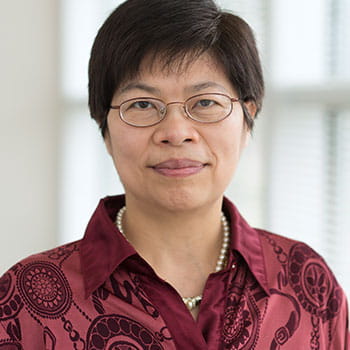Qizhen Shi Laboratory
Gene Therapy of Hemophilia A
Hemophilia a is a recessive, X-linked bleeding disorder resulting from factor VIII (FVIII) deficiency. Although protein replacement therapy is effective for hemophilia A treatment, up to 35% of patients may develop inhibitory antibodies (referred to as “inhibitors”) that neutralize FVIII activity. Introducing FVIII expression via genetic therapy is an attractive alternative treatment for hemophilia A patients. However, the potential to develop inhibitors to the transgene protein remains a significant concern.
We recently developed a novel gene therapy approach in which FVIII is targeted and stored in platelet a-granules. Using a transgenic mouse model, we showed that FVIII can be specifically expressed and stored together with its carrier protein, von Willebrand factor (VWF), in platelet a-granules when it is driven by the platelet-specific aIIb promoter (2bF8) and that platelet-FVIII can correct the murine hemophilia A phenotype even in the presence of high-titer inhibitors.
To apply this gene therapy to a clinically translatable protocol, we use lentiviral gene delivery to hematopoietic stem cells (HSCs) to introduce FVIII expression in platelets. We found that 2bF8 lentiviral gene delivery to HSCs can not only restore hemostasis, but also induce antigen-specific immune tolerance in hemophilia A mice. Our current work aims to 1) further optimize this approach; 2) dissect the potential underlying mechanisms by which immune tolerance is induced after platelet gene therapy; and 3) translate findings made in laboratory animals to human patients.
Gene Therapy of Hemophilia B
Hemophilia B is a genetic bleeding disorder that results from factor IX (FIX) deficiency. Although the incidence of anti-FIX inhibitor development is lower (5%) in hemophilia B patients after protein replacement therapy, anaphylaxis is a daunting problem in inhibitor patients, which limits the use of FIX infusion and increases the risk of morbidity and mortality. Our studies show that FIX can be ectopically expressed and stored in platelet a-granules when it is driven under the same aIIb promoter that we use for platelet-FVIII expression. Platelet-derived FIX, which is fully g-carboxylated, can rescue bleeding diathesis in hemophilia B mice, but the clinical efficacy is limited in the presence of anti-FIX inhibitors.
Although platelet-FIX does not maintain clinical efficacy in the face of inhibitors, targeting FIX expression to platelets is still an attractive potential strategy for gene therapy of hemophilia B. Indeed, our studies demonstrate that 2bF9 gene delivery to HSCs not only restores hemostasis, but also induces FIX-specific immune tolerance in hemophilia B mice. Our current work aims to optimize the FIX expression and develop a protocol for gene therapy of hemophilia B with pre-existing immunity.
FVIII Immune Responses in Hemophilia A
The development of inhibitors against FVIII is not only a significant complication in protein replacement therapy, but also a hurdle in gene therapy of hemophilia A. Understanding how FVIII immune responses occur may open a new therapeutic approach to limiting immune responses. Currently, we are dissecting the functional properties of recently identified subsets of immune cells, including T follicular help (Tfh) cells and T follicular help regulatory (Tfr) cells in FVIII immune responses. This will help us better understand the cellular and molecular mechanisms of FVIII inhibitor development and assist us in identifying potential novel targets for therapeutic intervention to prevent or reverse FVIII inhibitor development.
In addition, we want to know how VWF impacts FVIII immune responses in hemophilia A. Our studies demonstrate that VWF is essential for maintaining platelet-FVIII efficacy in hemophilia A with inhibitors. VWF reduces inhibitor activation of FVIII, exerting a protective effect both in vitro and in vivo. VWF/FVIII association, plus the apparent ability of VWF to delay the time-dependent inactivation of FVIII by inhibitors, provides mechanisms by which platelet-derived FVIII maintains function even in the presence of inhibitors when FVIII is targeted to platelets for gene therapy of hemophilia A with inhibitors. Our current work aims to investigate the roles of VWF in FVIII immunity in hemophilia A.

Qizhen Shi, MD, PhD
Senior Investigator and Program Co-Leader
Professor of Pediatric Hematology
Department of Pediatrics
Medical College of Wisconsin
Education and Training
Postdoctoral Training
Medical College of Wisconsin
Doctoral Training
Fujian Medical University, Fuzhou, Fujian, China